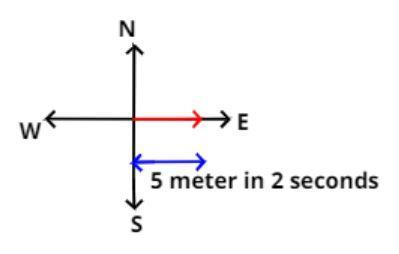Question
Question: A car travels 5m east in 2 seconds and then halts for the next 3 seconds. The magnitude of displacem...
A car travels 5m east in 2 seconds and then halts for the next 3 seconds. The magnitude of displacement of the car at the end of the given time interval is?
Solution
- Hint – In this question plot a 4 directional figure, depicting north, west, east and south. Let the motion along the positive x-axis be (i^), and form a vector equation to correspond to displacement of the car. This will help getting the answer.
Complete step-by-step solution -

The pictorial representation of the above problem is shown above.
A car travel 5 meter east in 2 seconds and then halts for next 3 seconds (i.e. car does not move for the next 3 seconds)
So the total distance covered is 5 meter in 2 seconds.
And the total time = (2 + 3) seconds
So as the car moves in the east let the direction be (i^).
Therefore the distance travelled by the car = 5i^ at the end of a given time interval as it stays for the next 3 seconds at the same position.
So the total displacement (d) of the car is
d=5i^ meter.
Now we have to find the magnitude of this so we have to take the modulus so we have,
Magnitude = ∣d∣=5i^=52=5 meter.
So this is the required answer.
Note – Any vector of the form a=axi+ayj+azk has magnitude that is ∣a∣=ax2+ay2+az2, in other words it is the square root of sum of squares of the individual components of the vector along x, y and z direction. A vector has both direction and magnitude hence the component form depicts the specification of the directions and the magnitude depicts the value.
